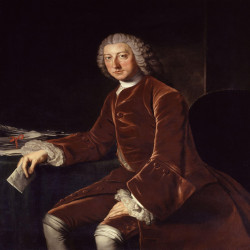
William Pitt, 1st Earl of Chatham
Former Prime Minister of the United Kingdom
| Date of Birth | : | 15 November, 1708 |
| Date of Death | : | 11 May, 1778 (Aged 69) |
| Place of Birth | : | Westminster, London, United Kingdom |
| Profession | : | Politician |
| Nationality | : | British |
William Pitt, 1st Earl of Chatham (উইলিয়াম পিট, চ্যাথামের প্রথম আর্ল) was a British Whig statesman who served as Prime Minister of Great Britain from 1766 to 1768. Historians call him Chatham or William Pitt the Elder to distinguish him from his son William Pitt the Younger, who was also a prime minister. Pitt was also known as the Great Commoner, because of his long-standing refusal to accept a title until 1766.
Biography
Pitt was a member of the British cabinet and its informal leader from 1756 to 1761 (with a brief interlude in 1757), during the Seven Years' War (including the French and Indian War in the American colonies). He again led the ministry, holding the official title of Lord Privy Seal, between 1766 and 1768. Much of his power came from his brilliant oratory.[1] He was out of power for most of his career and became well known for his attacks on the government, such as those on Walpole's corruption in the 1730s, Hanoverian subsidies in the 1740s, peace with France in the 1760s, and the uncompromising policy towards the American colonies in the 1770s.Pitt is best known as the wartime political leader of Britain in the Seven Years' War, especially for his single-minded devotion to victory over France, a victory which ultimately solidified Britain's dominance over world affairs. He is also known for his popular appeal, his opposition to corruption in government, his support for the American position in the run-up to the American Revolutionary War, his advocacy of British greatness, expansionism, and empire, and his antagonism towards Britain's chief enemies and rivals for colonial power, Spain and France.[3] Marie Peters argues his statesmanship was based on a clear, consistent, and distinct appreciation of the value of the Empire. The British parliamentary historian P. D. G. Thomas argued that Pitt's power was based not on his family connections but on the extraordinary parliamentary skills by which he dominated the House of Commons. He displayed a commanding manner, brilliant rhetoric, and sharp debating skills that cleverly utilised broad literary and historical knowledge.[ Scholars rank him highly among all British prime ministers.
Early life
Pitt was the grandson of Thomas Pitt (1653–1726), the governor of Madras, known as "Diamond" Pitt for having discovered a diamond of extraordinary size and sold it to the Duke of Orléans for around £135,000. This transaction, as well as other trading deals in India, established the Pitt family fortune. After returning home the Governor was able to raise his family to a position of wealth and political influence: in 1691 he purchased the property of Boconnoc in Cornwall, which gave him control of a seat in Parliament. He made further land purchases and became one of the dominant political figures in the West Country, controlling seats such as the rotten borough of Old Sarum.
Governor Thomas
William's father was Robert Pitt (1680–1727), the eldest son of Governor Pitt, who served as a Tory Member of Parliament from 1705 to 1727. His mother was Harriet Villiers,[9] the daughter of Edward Villiers-FitzGerald and the Irish heiress Katherine FitzGerald. Both William's paternal uncles Thomas and John were MPs, while his aunt Lucy married the leading Whig politician and soldier General James Stanhope. From 1717 to 1721, Stanhope served as effective First Minister in the Stanhope–Sunderland Ministry and was a useful political contact for the Pitt family until the collapse of the South Sea Bubble, a disaster that engulfed the government.
Quotes
Total 0 Quotes
Quotes not found.